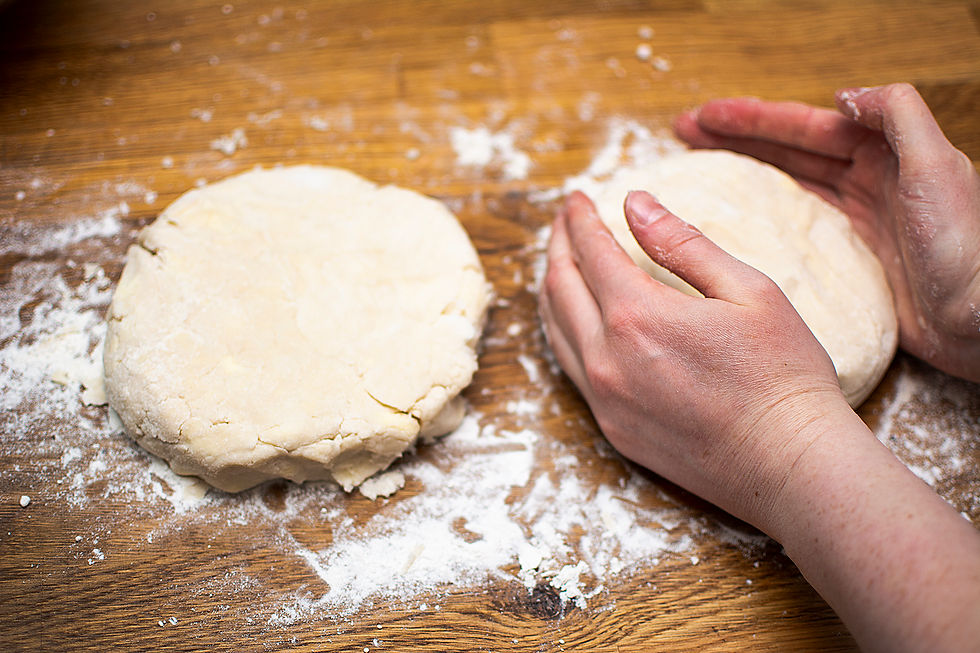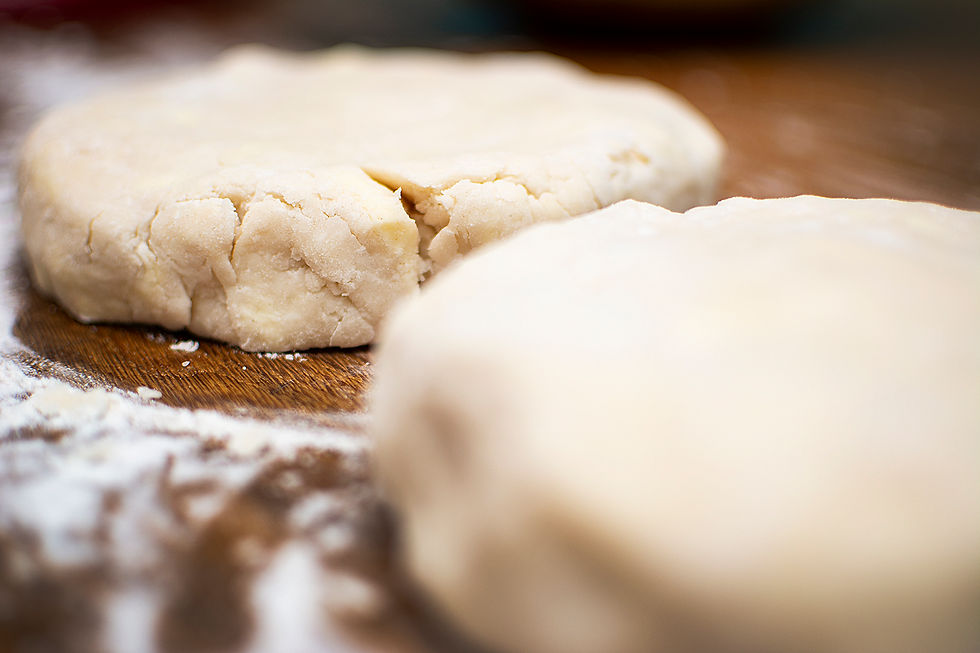Pie Crust
- zoethepastrysmith

- Feb 8, 2020
- 4 min read
Updated: May 3, 2020
This is my go-to pie dough. I use it for sweet pies and savoury pies. In the recipe I like to use butter for flavour, and lard gives it a nice, flakey texture. Lard can be swapped out for shortening if you want it to be vegetarian, but it's even more important that the shortening is very cold, even frozen, to keep the crust from getting too tough.
I also like to use salted butter, I think a bit of saltiness is especially delicious with a sweet pie like pecan.
This recipe will make two 9" pie crusts, or one double crust.

Recipe
Ingredients:
500g Flour
175g Butter, cold, cubed
175g Lard or Shortening, very cold, cubed
10g Salt
150g Water, very cold
2 x 9” Pie Plates
Directions:
Cut the butter and lard into 1/4 cubes. It's important that both are very cold, it's a god idea to pop them in the freezer for about half an hour before starting.
Combine the flour, butter, lard and salt in the bowl of a mixer. With the paddle attachment on low speed, mix until the pieces of fat are pea-sized.
Keeping the mixer on low speed, pour in the cold water. (warm water will melt the fat in the dough, and make it tough)
Mix until just combined.
Turn the dough out onto a floured surface, and bring together by hand.
Divide the dough into two even parts, and use your hands to shape into discs, about 5" wide and 2" thick. Wrap and refrigerate at least 1 hour.
When the dough is stiff and cold, place one disc onto a well floured surface. Add a generous dusting of flour on top.
Roll the dough into a circle about 3" wider all around than your pie plate. Rotate the dough and add flour as you work, to prevent it from sticking to your counter.
Place the dough over the pie plate, and gently ease it into the corners of the plate.
Trim the dough to leave a 1" edge around the pie plate.
Roll the edge of dough outward to create a smooth and even rim around the edge of the pie.
Crimp it with your fingers to create a zig-zag pattern (more detailed instructions below)
Step-by-Step Instructions

Gather your ingredients: 500g flour, 175g butter, 175g lard, 10g salt and 150g cold water.
Cut the cold butter and lard into 1/4" cubes.

In the bowl of your mixer, combine flour, butter, lard and salt. Mix with the paddle attachment on low speed.

You've mixed it enough when the butter and lard pieces are pea-sized. Having pieces of fat this size in your dough will make it flaky and delicious.

Keep the mixer on low speed and pour in the cold water.

Mix until the ingredients are just combined. Any dry patches left at this point can be mixed in by hand. Over mixing the dough will make a tough final crust.

Turn out the dough onto a floured surface.

If needed, work the dough a little to incorporate any flour that wasn't already mixed in.

Divide the dough in half.

Work the dough into two discs, about 5" across and 2" thick.

Once you have two discs of dough, wrap and refrigerate for at least one hour.

When the dough is stiff and cold, place one of the pieces onto a well floured surface, and generously dust the top of the dough with more flour.

Gently start rolling the dough.

Turn the dough frequently, adding more flour. This will prevent it from sticking to the counter, and let it relax. If the dough is stretched without being able to relax, it will shrink during baking, and warp the shape of your pie.

Roll the dough into a circle about 3" wider all around than your pie plate. You may see streaks of cold fat in the dough, this will make the crust nice and flaky.

Gently roll the dough onto your rolling pin, being careful not to tear it.

Place your pie plate on the surface

And unroll the dough onto the plate.

Gently ease the dough into the corners of the pie plate. Be careful not to stretch the dough, but press it in gently.

When the dough is in place, trim the edges with clean scissors, leaving about 1" around the edge of the plate.

Once again ease the dough into the corners of the plate, in case anything has moved out of place.

Begin to roll that extra edge of dough outward into a clean rim around the plate, hiding the seam against the plate.

Roll it tightly so that it doesn't expand when baking.

Finish the full edge of the pie plate, and go over it again with your fingers to ensure it is smooth and even. This edge should sit above the rim of the plate, so your slices of pie can easily be lifted off of the plate.

Use the crust as-is, if you like a smooth edge, or keep going to crimp the crust.

Use your fingers to pinch the edge of the crust into a nice zig-zag pattern. Dip your fingers in flour frequently to keep the dough from getting sticky

Continue this pattern along the rim of the pie

Finish the circle for an even crimp

The pie crust is ready to fill and bake.






Use this recipe every time! It’s my absolute favourite.
Yum!! Can’t wait to make